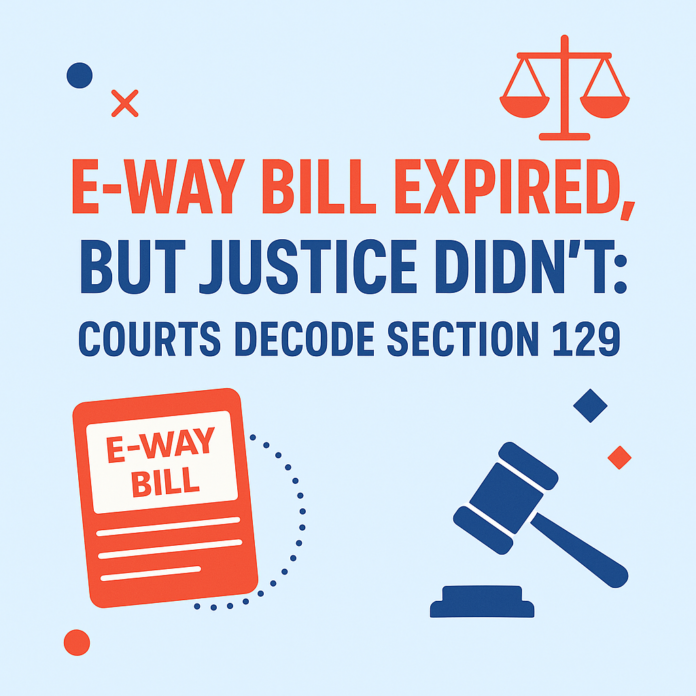In recent years, the misuse of Section 129 of the CGST Act, 2017—governing detention and seizure of goods and conveyance—has drawn sharp judicial criticism. While the provision intends to curb tax evasion through improper documentation during transit, several High Courts have emphasized that absence of mens rea (wrongful intent) must guide the application of this penal clause. Let’s explore how courts have consistently laid down that mere procedural lapses such as expired E-Way Bill or incomplete Part-B cannot invoke Section 129, unless the taxpayer’s intention to evade tax is clearly established.
Orson Holdings Company Ltd. v. Union of India (2023) 3 Centax 48 (Guj.)
Facts: The e-Way Bill expired 48 hours before interception. The goods were in transit from West Bengal to Gujarat.
Held: The Gujarat High Court quashed the penalty order as no ill-intent or intent to evade tax was found. It ruled that “Section 129 cannot be applied in isolation; it must be read with Sections 73, 74 and Circular 64/38/2018” which advise leniency in bona fide errors.
✅ Conclusion: Penalty not sustainable where goods are in long-distance transit and delay is bona fide.
Shree Govind Alloys Pvt. Ltd. v. State of Gujarat (2023) 4 Centax 368 (Guj.)
Facts: The E-Way Bill expired 41 hours before inspection; the truck had remained non-motorable.
Held: No allegation of tax evasion or fraudulent intent was established. Gujarat High Court directed release and quashing of penalty under Section 129(3).
✅ Conclusion: Mechanical invocation of Section 129 is invalid where no mens rea exists.
Tata Hitachi Construction Machinery Co. Pvt. Ltd. v. State of U.P. (2025)
Facts: E-Way Bill’s Part-B was not filled due to oversight.
Held: The Allahabad High Court held that non-filing of Part-B alone, without tax evasion intent, cannot attract penalty under Section 129.
✅ Conclusion: Procedural lapse ≠ intention to evade; penalty was set aside.
Precision Tools India v. State of U.P. (2024) 16 Centax 51 (All.)
Facts: Part-B of E-Way Bill not filled due to technical glitch; goods were custom-made.
Held: The Allahabad HC reiterated that penalty requires proof of intent to evade tax, referring to M/s Roli Enterprises and other binding precedents.
✅ Conclusion: Penalty quashed where error was technical and not deliberate.
Spirare Energy Pvt. Ltd. v. State of U.P. (2024) 15 Centax 305 (All.)
Facts: Minor error in consignee’s address in the E-Way Bill.
Held: The court noted that such technical error does not justify penalty, especially in absence of fraudulent intention.
✅ Conclusion: Mens rea is sine qua non (essential condition) for invoking Section 129.
What Courts Say About Section 129
– CBIC Circular No. 64/38/2018-GST cautions against penalizing minor clerical mistakes.
– Judicial trend underscores that intent to evade tax must be clearly shown.
– Detention of goods in absence of such intent is seen as arbitrary, disproportionate, and violative of natural justice.
Conclusion
Penalty under Section 129 should not be a default consequence for every lapse in e-Way Bill compliance. Courts across jurisdictions have repeatedly emphasized that tax evasion must be intentional and proven, not presumed from minor errors. Tax officers must exercise discretion judiciously, ensuring that the spirit of the law doesn’t get lost in its letter.



